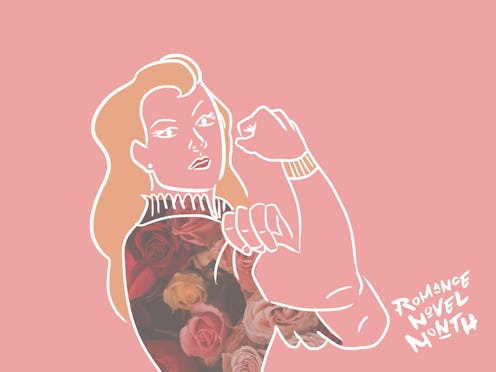Books
7 Ways Romance Novels Celebrate Feminism

Romance novels often get a bad rap for being "fluffy," "trashy," and "insignificant." But among all of the rippling chests, the ripped bodices, and the promises of happily ever after, romance novels are feminist works in many different ways. After all, romance is a genre primarily written for women, by women. I'm not saying every romance is feminist. Like in any genre, some books are problematic. But many romances are feminist.
Feminism is about the belief that women and men should have equal rights and opportunities. That includes creating spaces for women's voices to be heard. Publishing has been a boys' club for most of history, but the romance genre has long been a protected space for women's writing. Is this perhaps why romance is often snubbed by the literary world? Or is it that the perception of the genre yielded room for women to make it their own? In either case, just like with most institutions, we can't overlook how stigma against women has played a hand in the perception of the genre.
While there are many romance tropes that don't feel feminist — e.g. damsels in distress, knees growing weak at the sight of a man – the fact is that not every romance novel uses those tropes. Romance a vastly different genre than it was five, 10, 30 years ago. If you dive into the romance section today, you'll find so many different stories about women taking charge, women getting what they want, and women turning the tables on tough situations. Romance novels are only tied together by one thing: a happily ever after. Everything that happens in the middle is up to the author, and the author often chooses to take the story in some pretty incredible, feminist directions.
Here are just a few ways in which romance novels represent our feminist ideals.
1. They feature strong female protagonists.
The romance section is filled with stories told from the female perspective, which on its own is pretty awesomely feminist. But on top of that, particularly in recent years, many authors have chosen to lead their stories with strong, intelligent, ambitious women responsible for their own decisions — when it comes to their career, their life-path, their sexuality, and their partner.
2. It's a genre filled with women's voices.
Statistically, in the literary world, men outnumber and overshadow women. But romance is dominated by female writers, female editors, female publicists, and female readers. The genre also brings in the most money; in 2013, the last year for which the Romance Writers of America has data, romance novels generated $1.08 billion.
3. Women's needs are placed first.
In today's world, so much of our media is geared towards the sexual experiences of straight, cisgender men. So it's extremely significant that most romances are written with an emphasis on female pleasure and female happiness.
Author Olivia Wait explains its importance perfectly: "As often as one is likely to see a romance trope that feels old and regressive, one will read a scene where the hero cannot wait to pleasure the heroine with oral sex. Looking around at pop culture at large, there is no other space where such scenes happen — especially not regularly."
4. They allow women to explore their fantasies.
Everyone's sexuality is different. Through romance books, women are able to easily explore what turns them on, completely hassle-free. Learning about what you like and what you want in a safe space is a game-changer.
5. They allow women to take control of their sexuality, regardless of what their situation is IRL.
Historically, women were not in control of their sexualities. Even today, it's much more accepted for men to explore their fantasies. But romance novels allow women to take control of their sexuality, by diving into a story that excites them, at whatever time and place suits them best.
6. The genre allows topics that have been outcast as "taboo" to be explored in depth.
Romance novels have long been a home to ideas rejected or overlooked or deemed too 'scandalous' by the mainstream literary world and mainstream media. But there's guaranteed to be something for you in romance.
7. The genre allows many voices to get their foot in the door.
Self-publishing is huge in romance, and Romance Writers of America does not require you to be published to be a member or attend their conference. This means that many of the barriers preventing people from being published in other genres aren't as prevalent in the romance world. However, even so, like the rest of the publishing world, the mainstream romance genre could improve its representation, and there is a growing initiative to increase diversity within the genre—for instance, #WOCInRomance.
Beginning on August 1, Bustle will host Romance Novel Month, a celebration and examination of the romance novel genre. But don't worry, romance readers: the coverage won't end in August. We're proud to support romance novels, and we will continue to do so all year long.
Images: Alyssa Foote/Bustle